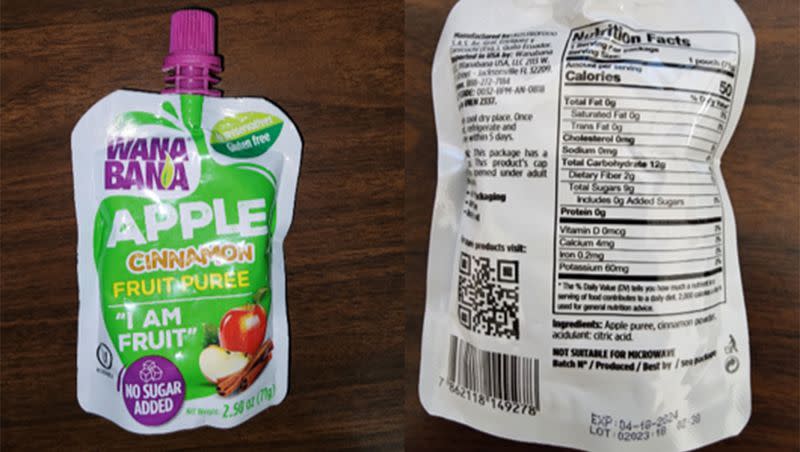Lead was found in children’s fruit puree pouches. Here’s what you need to know

The FDA is warning parents about lead found in some WanaBana children’s fruit puree pouches and urging them to look for signs of lead poisoning in children who consumed the products.
The FDA warning applies to all of WanaBana’s apple cinnamon puree pouches, regardless of lot code or expiration date.
Adults should not purchase the pouches or feed them to children, the FDA says.
How was the lead contamination found?
The North Carolina Department of Health and Human Services started investigating WanaBana’s apple cinnamon puree pouches after four children who had consumed them were determined to have “elevated blood lead levels, indicating potential acute lead toxicity,” according to the FDA.
The North Carolina health department then tested multiple lots of the product and found “extremely high concentrations of lead.”
Where were WanaBana’s fruit pouches sold?
The fruit pouches were sold across the country through several retailers, including Sam’s Club, Amazon and Dollar Tree.
The FDA is working with WanaBana to restrict purchase of the contaminated fruit pouches and remove the contaminated fruit pouches from stores.
Why is lead exposure dangerous?
The Centers for Disease Control and Prevention says lead exposure is most harmful to children under the age of 6. It can:
Harm their brain and nervous system.
Lead to learning and behavioral problems.
Negatively affect their growth and development.
What are signs of lead poisoning in children?
Lead toxicity is identified through a blood test, which can be arranged through your healthcare provider. Symptoms may not immediately manifest, so the FDA urges parents to get their children tested if they ate the fruit pouches.
Parents should look for the following short-term symptoms of lead toxicity in their children, per the FDA:
Headache.
Abdominal pain.
Colic.
Vomiting.
Anemia.
The FDA says to look for the following long-term lead exposure symptoms in addition to the short-term symptoms:
Irritability.
Lethargy.
Fatigue.
Muscles aching, prickling or burning.
Constipation.
Difficulty concentrating.
Muscular exhaustibility.
Tremors.
Weight loss.
How is lead poisoning treated?
No medicine can undo the affects of lead exposure, according to C.S. Mott Children’s Hospital. The progression of the lead exposure symptoms can be halted by ending the child’s exposure to the lead object. Chelation therapy can be used in the case of severely high lead blood levels, but the therapy could result in life-threatening side effects.

